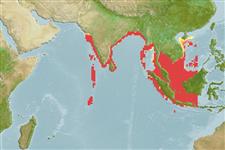分类 / Names
俗名 | 同种异名 | Catalog of Fishes(属, 种) | ITIS | CoL | WoRMS | Cloffa
Teleostei >
Scombriformes (Mackerels) >
Scombridae (Mackerels, tunas, bonitos) > Scombrinae
Etymology: Scomberomorus: Latin, scomber = mackerel + Greek, moros = silly, stupid (Ref. 45335).
More on author: Cuvier.
Environment: milieu / climate zone / depth range / distribution range
生态学
海洋; 海洋洄游的 (Ref. 51243). 熱帶; 24°N - 11°S, 70°E - 115°E (Ref. 168)
Indo-West Pacific: west coast of India and Sri Lanka eastward to Thailand, Malaysia and Java (Ref. 9684). Does not extend further out in the East Indies (Ref. 9684).
印度-西太平洋: 印度西岸與斯里蘭卡向東至泰國,馬來西亞與爪哇。 (參考文獻 9684) 不延伸到進一步的在東印度群島中的外.(參考文獻 9684)
Length at first maturity / 大小 / 重量 / 年龄
Maturity: Lm 70.0 range ? - ? cm
Max length : 94.0 cm FL 雄鱼/尚未辨别雌雄; (Ref. 168); 98.0 cm (female); common length : 70.0 cm FL 雄鱼/尚未辨别雌雄; (Ref. 9684)
背棘 (总数) : 15 - 18; 背的软条 (总数) : 15 - 19; 臀鳍软条: 17 - 22; 脊椎骨: 44 - 46. A unique pigment pattern of short lines on the sides which distinguishes from all other species of Scomberomorus; maxilla with the posterior end greatly expanded; parasphenoid wide (Ref. 10996). Interpelvic process small and bifid. Lateral line without auxiliary branches anteriorly, running almost straight below second dorsal finlet then slightly bent downward toward keel of caudal peduncle. Intestine with 2 folds and 3 limbs. Swim bladder absent. Body covered with small scales. First dorsal fin black posteriorly.
一个短线的独特有颜色图案侧边上从所有的其他种的 Scomberomorus 可用来区别; 颚骨用后端非常扩大; 广阔地的副蝶骨.(参考文献 10996) 腹鳍间的突起小而两裂的。 没有附加的分支的侧线前面地,然后些微地几乎笔直地在第二背鳍小鳍之下跑弯曲向下的对于尾柄的龙骨脊。 肠道有 2 摺层与 3 肢翼。 泳鳔不存在。 身体覆盖着小鳞片。 在后部地的第一背鳍黑色。
Unlike S. commerson and S. guttatus, S. lineolatus is not encountered in very turbid waters or much reduced salinity. Feeds primarily on fishes. Also taken with midwater trawls, purse seines and by trolling (Ref. 9684). Taken from Oct.-Nov. along the Thai coast, Indian Ocean; in Malaysia Nov.-Feb. in the west coast, Mar.-Jul. in the south, Feb.-Mar. and Aug.-Nov. in the east; in India from May-Sept. with other seerfishes. Marketed mainly fresh; also dried-salted (Ref. 9684). Also consumed as spicy fishballs.
不像 S. commerson 与 S. guttatus , S. lineolatus 在非常浑浊的水域没被见到或者缩得很小盐度。 主要吃鱼。 也用中层水域拖网,囊袋网捕获与藉着拖钓.(参考文献 9684) 取自了十月-十一月沿着泰国海岸,印度洋; 在西岸中的马来西亚十一月-二月, 三月-七月。 在南方中, 二月-在东部中的三月与八月-十一月; 在印度从五月-九月与其它的鲭科鱼类在一起。 生鲜地主要地在市场上销售; 也乾燥盐腌.(参考文献 9684) 也做成辣鱼丸食用。
Life cycle and mating behavior
成熟度 | 繁殖 | 产卵场 | 卵 | 孕卵数 | 仔鱼
印度-西太平洋: 印度西岸與斯里蘭卡向東至泰國,馬來西亞與爪哇。 (參考文獻 9684) 不延伸到進一步的在東印度群島中的外.(參考文獻 9684)
Collette, B.B. and C.E. Nauen, 1983. FAO Species Catalogue. Vol. 2. Scombrids of the world. An annotated and illustrated catalogue of tunas, mackerels, bonitos and related species known to date. Rome: FAO. FAO Fish. Synop. 125(2):137 p. (Ref. 168)
世界自然保护联盟红皮书 (Ref. 130435: Version 2024-1)
人类利用
渔业: 商业性; 游钓鱼种: 是的
工具
特别资料
下载 XML
网络资源
Estimates based on models
Preferred temperature (Ref.
123201): 23.8 - 28.6, mean 27.7 °C (based on 595 cells).
Phylogenetic diversity index (Ref.
82804): PD
50 = 0.5000 [Uniqueness, from 0.5 = low to 2.0 = high].
Bayesian length-weight: a=0.00676 (0.00359 - 0.01272), b=3.00 (2.84 - 3.16), in cm total length, based on LWR estimates for this species & Genus-body shape (Ref.
93245).
营养阶层 (Ref.
69278): 4.5 ±0.80 se; based on food items.
回复力 (Ref.
120179): 中等的, 族群倍增时间最少 1.4 - 4.4年 (K=0.18-0.22; tm=2; Fec=560,000).
Fishing Vulnerability (Ref.
59153): Very high vulnerability (82 of 100).
Climate Vulnerability (Ref.
125649): Very high vulnerability (82 of 100).
Nutrients (Ref.
124155): Calcium = 31.6 [14.0, 106.5] mg/100g; Iron = 0.806 [0.360, 1.933] mg/100g; Protein = 20.6 [19.3, 21.8] %; Omega3 = 0.267 [0.165, 0.431] g/100g; Selenium = 58.3 [21.7, 190.0] μg/100g; VitaminA = 25.5 [6.3, 113.2] μg/100g; Zinc = 0.659 [0.434, 1.038] mg/100g (wet weight);
